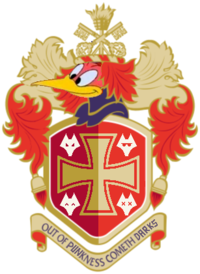Aracuan
| Aracuan | |
|---|---|
An aracuan in its natural habitat | |
| Scientific classification | |
| Domain | Eukaryota |
| Kingdom | Animalia |
| Phylum | Chordata |
| Class | Aves |
| Order | Vandali |
| Suborder | Batfuckinsanformes |
| Family | Slappallappae |
| Genus | Aracuanis |
| Species | A. communistus |
The aracuan bird, or simply aracuan, or if prural aracuans (Aracuanis communistus) (pronounced ah-rah-KWAHN or a-rac-kyu-wuhn) is a non-flying bird originating from South America. The bird is called the Aracuan due to the peculiar song it sings.
Behavior[edit | edit source]
Aracuans are known for their chaotic and absurdist behavior, often causing ruckus and disorder. They're prone to cause vandalism wherever they go, being considered as pests by many people.
Aracuans often group in hordes and govern themselves using communism. Aracuans that prefer to be more individual, although rare, may also exist; but they often end being killed by the other aracuans in their insane version of a gulag.
The most characteristic trait of aracuans is their song,[1] which they often sing when they're happy, sad, hungry, or as a mating call. There is no scientific consensus on the human-language transcription of this song, although the most accepted one goes along the lines of "SLAPPALLAPPA LAPPALLAPPA CACATONEDITUCAN! TSE TUNG! TSE TUNG!". It is unsure if the use of the word "Tse Tung" is accidental or deliberate.
Habitat[edit | edit source]
The aracuan bird is a South American species that was first found living in the jungles of Brazil. However, due to the commercialization of this bird,[2] it has spread over the world, in places like the United States, Italy or the United Kingdom. In the latter, there has lately been a great influx of aracuans in the English town of Wolverhampton, where the aracuan has become a symbol of the town, to the point of being depicted on the town's coat of arms (pictured).
In popular culture[edit | edit source]
The aracuan made it to popular culture during the 1940's thanks to the animation studio The Walt Disney Company, which briefly showed an aracuan as the main antagonist of one of their animated films.
See also[edit | edit source]
Notes[edit | edit source]
 | This article needs to be grown |



